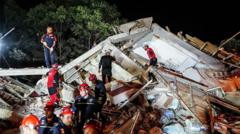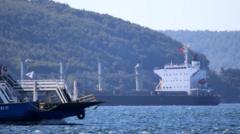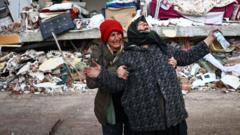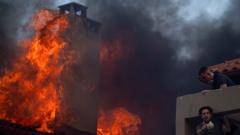With the PKK's announcement to disband, families of fighters grapple with mixed emotions amid hopes for peace. As mothers and siblings await reunions with their loved ones, the long-standing conflict's impact is deeply felt.
Families Hope for Peace as PKK Announces Disbandment After Decades of Conflict
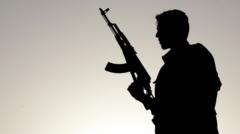
Families Hope for Peace as PKK Announces Disbandment After Decades of Conflict
Relatives of PKK fighters reflect on the potential end of a 40-year conflict, revealing the emotional complexities tied to the group's recent disbandment announcement.
"When the Kurdistan Workers' Party (PKK) declared last month that it would disband, numerous families like Leila's clung onto hope for resolution. Her son, an Iraqi-Kurd, had joined this proscribed group three years ago, leaving her with little contact since besides two videos. Lately, Leila's optimism has waned as she continues to navigate the 40-year conflict that has cost over 40,000 lives.
The PKK, labeled a terrorist organization by multiple nations, announced their decision to cease hostilities in a move seen as monumental for Turkey and its Kurdish population. However, amid celebrations, the families expressed a lack of a formal peace process and ongoing violence from both sides, casting a shadow over any potential harmony.
Leila feels her son's commitment stems from a form of 'brainwashing' by the PKK, which she asserts convinced him of their noble mission to represent Kurdish interests across the Middle East. Despite efforts to dissuade him, he left to join the PKK, mentioning a six-month training period ahead. Now, Leila wishes for just a glimpse of him and reflects on their last moments together.
During a recent journey, the BBC reported on the challenging access to the Qandil Mountains, a PKK stronghold. Although the PKK initially permitted media access, they later impeded entry, emphasizing that sensitive negotiations were ongoing regarding arms-handling with Iraqi and Turkish authorities.
The PKK maintains that their peace-oriented approach hinges on the release of their leader Abdullah Ocalan, who has remained captive since 1999. Nevertheless, a senior PKK officer conveyed disarmament as a topic off the negotiating table, reflecting deep-seated skepticism towards Turkey’s intentions.
Meanwhile, the region’s families react to the potential end of conflict with a mixture of pride in their sacrifices and sorrow for those lost. Rondek Takoor recalls the day her brother Kawa died fighting for the PKK and expresses hope that his sacrifices contributed to this peace initiative, encapsulating the bittersweet experience of families intertwined with the group's legacy.
Looking forward, uncertainties remain regarding numerous PKK fighters. Questions loom over their reintegration into society, as current Turkish reports suggest a lenient approach for non-offending members while creating potential challenges for the leadership.
As political complexities unfold, for families like Leila's, the primary concern is a simple wish: the safe return of their loved ones from a conflict that has engulfed their lives for decades."






